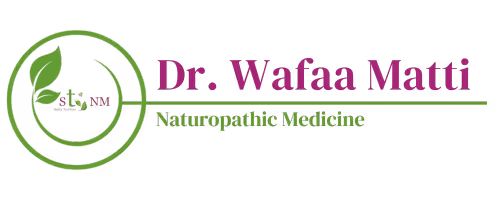.png)
Struggling to breathe easy? You’re not alone. For millions living with Chronic Obstructive Pulmonary Disease (COPD), everyday activities—from walking across the room to enjoying time outdoors—can feel like a struggle. But managing COPD doesn’t have to rely on medications and oxygen alone. There’s more than one way to support your lung health—and that’s where integrative care comes in.
COPD is a progressive respiratory condition that includes chronic bronchitis and emphysema, both of which cause airflow limitation and breathing difficulties. While conventional medicine focuses on symptom management, integrative COPD care takes it a step further by addressing inflammation, immunity, nutrition, and environment—all of which affect your lungs' ability to function.
Understanding COPD
What Is COPD?
Chronic Obstructive Pulmonary Disease (COPD) is a long-term, progressive lung condition that makes it difficult to breathe. It primarily includes two major conditions:
- Chronic Bronchitis: Inflammation of the airway lining, causing persistent coughing and mucus production.
- Emphysema: Damage to the air sacs (alveoli) in the lungs, reducing the lungs' ability to absorb oxygen and release carbon dioxide.
What Causes COPD?
COPD typically develops after years of exposure to lung irritants, which trigger inflammation and damage to the airways and lung tissue. Common causes include:
- Cigarette smoke – the leading cause in most cases.
- Air pollution and poor indoor air quality.
- Occupational exposure to chemicals, dust, or fumes (e.g., from farming, construction, factory work).
- Genetic factors, such as Alpha-1 Antitrypsin Deficiency, in rare cases.
Recognizing COPD Symptoms
Early-stage COPD may be mistaken for a lingering cough or low energy, but it gradually worsens if left untreated. Common symptoms include:
- Persistent cough, often with mucus (especially in the morning).
- Shortness of breath, particularly during physical activity.
- Chest tightness and wheezing.
- Frequent respiratory infections, such as bronchitis or pneumonia.
- Fatigue, due to lower oxygen availability throughout the body.
How COPD Is Diagnosed
A proper diagnosis is essential to create an effective, individualized treatment plan. Diagnostic tools may include:
- Spirometry: A lung function test that measures how much air you can exhale and how quickly.
- Chest X-rays or CT scans: Used to detect emphysema or rule out other lung problems.
- Oxygen saturation tests: To assess how well oxygen is circulating through your bloodstream.
What Is Integrative Care for COPD?
Integrative care is a patient-centered model that blends the best of conventional medicine with proven naturopathic, nutritional, and lifestyle therapies to create a comprehensive plan for managing chronic conditions—like COPD.
Instead of treating symptoms in isolation, integrative care addresses the underlying contributors to respiratory decline, such as chronic inflammation, environmental toxins, nutritional deficiencies, and immune dysregulation. It offers a whole-person approach—supporting not only lung function but also the systems that influence energy, immunity, and recovery.
Core Goals of Integrative COPD Care
Improve Lung Function and Oxygen Delivery
By supporting tissue oxygenation and lung efficiency through nutrition, breathing practices, and gentle physical activity, integrative therapies help patients breathe easier and stay more active.
Reduce Inflammation and Oxidative Stress
Many COPD symptoms are worsened by ongoing inflammatory processes and oxidative damage in the lungs. Anti-inflammatory herbs, antioxidant-rich foods, and targeted nutrients like vitamin C and magnesium are used to calm inflammation and protect lung tissue.
Support Immune Health and Energy Levels
COPD often coincides with frequent infections and profound fatigue. Integrative care strengthens the immune system through gut health optimization, adaptogenic herbs, and micronutrient therapy—helping patients feel stronger and more resilient.
Minimize Side Effects from Medication
Long-term use of inhalers, corticosteroids, and antibiotics can lead to nutrient depletion, bone loss, and gut issues. Naturopathic medicine works to counterbalance these side effects and protect overall health, while still respecting the importance of conventional therapies.
Key Integrative Therapies for COPD
Nutritional Therapy
Food is powerful medicine—especially for the lungs. A targeted nutritional approach can significantly influence inflammation, mucus production, and energy levels in COPD patients.
Anti-Inflammatory Diet
An ideal COPD-supportive diet includes:
- Omega-3 fatty acids (from flaxseed, walnuts, wild-caught fish) to combat inflammation.
- Antioxidant-rich foods (like berries, broccoli, and green tea) to reduce oxidative stress on lung tissue.
- Low-glycemic whole foods to stabilize blood sugar and reduce fatigue.
Respiratory-Supportive Foods
Certain foods have been traditionally used to support respiratory health, including:
- Garlic: Antimicrobial and mucolytic properties.
- Leafy greens: High in magnesium and chlorophyll for oxygen transport.
- Turmeric: Natural anti-inflammatory with curcumin to reduce airway inflammation.
Weight Management and Acid Reflux
Excess weight can impair breathing, while GERD (acid reflux) can worsen COPD symptoms by irritating the airways. Nutritional guidance helps:
- Maintain a healthy weight to ease respiratory strain.
- Avoid trigger foods (spicy, acidic, fried) that contribute to reflux and inflammation.
Herbal & Botanical Medicine
Herbs can be powerful allies for improving lung function, thinning mucus, and easing chronic cough. These should always be used under the supervision of a trained practitioner, like Dr. Matti, to ensure safety—especially when combined with conventional medications.
Lung-Supportive Herbs
- Mullein: Soothes the respiratory tract and promotes expectoration.
- Lobelia: A bronchial dilator that may ease wheezing and tightness.
- Licorice root: Acts as an anti-inflammatory and demulcent; supports adrenal health.
- Elecampane: Traditionally used to clear phlegm and soothe bronchial tissue.
Expectorant & Anti-Inflammatory Botanicals
Additional herbs may be recommended to:
- Thin mucus,
- Support immune response,
- Reduce airway inflammation,
- Relieve coughing.
Note: Some botanicals may interact with medications or raise blood pressure, so individualized dosing and careful selection are essential.
Breathing Techniques & Mind-Body Practices
Breathing is central to life—and for those with COPD, learning to breathe more efficiently and mindfully can drastically improve lung capacity and daily comfort. Dr. Wafaa Matti integrates both modern and ancient breathwork techniques to help patients manage symptoms and enhance oxygen intake.
Therapeutic Breathing Techniques
- Diaphragmatic breathing: Encourages deeper breaths by engaging the diaphragm rather than shallow chest muscles.
- Pursed-lip breathing: Slows exhalation, maintains airway pressure, and prevents air trapping in the lungs.
Advanced Breathwork Modalities
- Buteyko breathing: A technique to retrain CO₂ tolerance and reduce over-breathing.
- Pranayama: Yogic breath regulation that improves respiratory control and promotes calm.
Mind-Body Integration
Movement therapies that combine breath, posture, and mindfulness offer both respiratory and psychological benefits:
- Qi Gong and Tai Chi: Improve balance, lung expansion, and energy flow.
- Gentle yoga: Enhances flexibility and oxygenation while reducing stress.
IV and IM Nutrient Therapy (Where Appropriate and Permitted)
Many individuals with COPD are nutrient-depleted due to chronic inflammation, poor absorption, and medication side effects. Where naturopathic scope permits and under clinical supervision, targeted IV (intravenous) or IM (intramuscular) therapy can help replenish critical nutrients.
Commonly Used Nutrients:
- Vitamin B12: Boosts energy, nerve health, and red blood cell production.
- Magnesium: Supports muscle relaxation and eases bronchial spasms.
- Vitamin C: Acts as a powerful antioxidant and immune enhancer.
Lifestyle & Environmental Detox
Your environment plays a huge role in respiratory health. Integrative care includes practical steps to reduce lung irritants and support detoxification naturally.
Smoking Cessation
For smokers, quitting is the single most important step to slow COPD progression. Dr. Matti offers:
- Herbal support to reduce cravings.
- Stress-reduction techniques to manage withdrawal.
- Nutrient support for lung repair and detox.
Indoor Air Quality
Since most people spend the majority of their time indoors:
- Use HEPA filters to reduce airborne particulates.
- Address mold, dust, and pet dander triggers.
- Consider natural cleaning products to avoid chemical inhalants.
Gentle, Guided Movement
Regular movement improves circulation, lung function, and mood. Dr. Matti designs low-impact activity plans that match each patient’s capacity—helping rebuild stamina without strain.
Breathe Easier With Integrative COPD Care
Living with COPD can be challenging—but it doesn’t have to feel hopeless. While it's a progressive lung condition, integrative care empowers you to take control of your respiratory health, reduce flare-ups, and improve your day-to-day life with natural, supportive therapies.
By blending the strengths of conventional medicine with holistic tools like nutrition, herbal medicine, breathwork, and environmental support, Dr. Wafaa Matti’s approach is about more than managing symptoms—it’s about restoring resilience and vitality from the inside out.
Whether you’re newly diagnosed or seeking better control of an existing condition, integrative care provides a compassionate, customized path to stronger lungs, calmer breathing, and improved energy.
Looking for natural support for COPD?
📞 Call Today: 760-274-2377
📍 Visit Us By Appointment: 324 Encinitas Blvd, Encinitas, CA 92024
🌐 Book Online: drwafaamatti.com
📧 Email: clinic@drwafaamatti.com
.svg)
Explore Our Latest Insights
Discover tips for better digestive health.
Ready to Take the Next Step?
Reach out today to schedule your visit or ask a question—Dr. Wafaa’s team is here to support your wellness journey, both in person and online.


